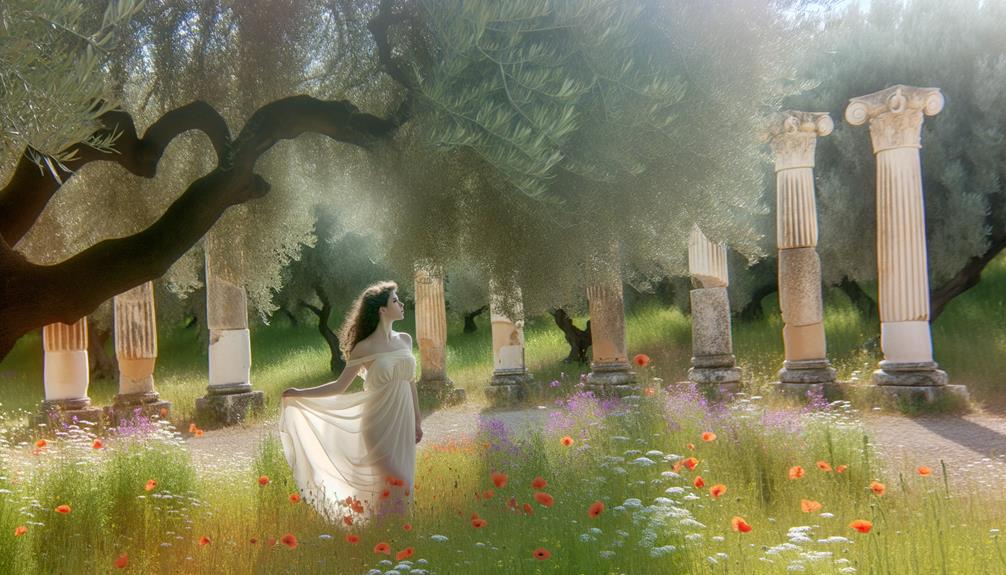Julia Name Meaning and Origin
The name Julia traces back to the Latin name Julius and boasts noble origins deeply rooted in Roman history. It represents youthfulness, deriving from the term meaning youthful or downy.
Historically associated with the prestigious gens Julia, the name carries connotations of nobility and continuity. Julia has been immortalized in literature, such as Shakespeare's works, where characters bearing the name exude grace and strength.
The name enjoys enduring popularity, consistently ranking in top baby name lists since the 1990s due to its elegance and historical significance. Explore further to uncover its timeless appeal and cultural richness.

Key Takeaways
- Julia originates from the Latin family name Julius, meaning youthful or downy.
- It has historical significance among Roman patrician families, linked to the gens Julia.
- The name symbolizes nobility, heritage, and continuity.
- Julia has timeless cultural appeal in literature, film, and art, embodying grace and strength.
- It has consistently ranked in the top 100 names since the 1990s.
Historical Roots
The name Julia has its historical roots deeply embedded in ancient Roman culture, originating from the Latin name Julius. This nomenclature was highly significant among Roman patrician families, especially the gens Julia, one of Rome's most ancient and distinguished lineages.
The gens Julia claimed descent from Iulus, the son of Aeneas, linking the family to the mythic founders of Rome. The name Julia, as a result, carried connotations of nobility, heritage, and a storied past. It symbolized continuity and prestige, often bestowing a sense of identity and belonging upon its bearers.
This historical context underscores the cultural importance and enduring legacy of the name Julia, which has been preserved and adapted through centuries into the modern era.
Latin Origins
Rooted in the Latin language, the name Julia derives from the ancient Roman family name Julius, signifying a rich cultural heritage. This etymology encapsulates more than just a name; it reflects a lineage tied to Roman nobility and their societal contributions. The name's enduring popularity can be attributed to its classical elegance and historical significance.
| Aspect | Details | Significance |
|---|---|---|
| Language | Latin | Classical origins |
| Family Name | Julius | Noble Roman lineage |
| Gender | Female | Traditional feminine form |
| Historical Usage | Ancient Rome | Deep historical roots |
| Meaning | Youthful, Downy | Reflects youthful qualities |
This table reveals the multi-dimensional facets of the name Julia, from its noble beginnings to its lasting cultural resonance.
Cultural Significance
Julia's cultural significance spans literature, film, and art, showcasing its timeless appeal and versatile presence across various mediums.
In the world of cinema, characters named Julia often embody grace, strength, and complexity, reflecting the name's enduring allure. Renowned actresses such as Julia Roberts have further cemented the name's popularity, making it synonymous with elegance and talent.
In art, Julia has been immortalized in various forms, from classical paintings to contemporary installations, signifying its deep-rooted aesthetic value.
The name's historical resonance, coupled with its modern-day relevance, underscores a rich cultural tapestry that bridges ancient traditions with contemporary interpretations.
Therefore, Julia continues to be a name that evokes admiration, respect, and cultural richness across different domains.
Literary References
The name Julia has been prominently featured in literature, most prominently in William Shakespeare's play 'The Two Gentlemen of Verona,' where the character Julia is a central figure.
Modern literary works continue this tradition, with numerous contemporary authors crafting complex characters named Julia, thereby enriching the name's cultural and literary heritage.
Analyzing these references provides insight into the enduring appeal and versatility of the name Julia across different literary periods.
Shakespearean Influence on Julia
William Shakespeare's works have greatly contributed to the cultural and literary prominence of the name Julia, most particularly through his play 'The Two Gentlemen of Verona.'
In this early comedy, Julia is portrayed as a resourceful and determined character, embodying traits of loyalty and intelligence. Her decision to disguise herself as a boy to be close to her beloved Proteus exemplifies her proactive nature and resilience.
Shakespeare's nuanced depiction of Julia not only solidified the name's presence in literary canon but also imbued it with connotations of strength and adaptability. This portrayal has, over time, influenced the perception of the name Julia, rendering it synonymous with ingenuity and emotional depth, thereby enhancing its timeless appeal.
Modern Literary Julia Characters
Contemporary literature continues to explore the multifaceted character of Julia, endowing her with a spectrum of personalities and narratives that reflect modern themes and societal changes.
In George Orwell's '1984,' Julia embodies rebellion and complexity, challenging oppressive regimes while navigating personal freedom.
Similarly, Julia in Julie Powell's “Julie and Julia” represents self-discovery and modern ambition, highlighting the journey toward fulfillment in contemporary settings.
These portrayals illustrate Julia as a versatile figure, adapting to diverse genres and themes.
Whether as a symbol of resistance or a seeker of self-actualization, modern literary Julians are crafted to resonate with readers, providing insightful commentary on evolving human experiences and the nuanced roles women play in today's literary landscape.
Popularity Over Time
Julia has experienced fluctuating popularity over the decades, reflecting broader societal trends and cultural influences.
In the early 20th century, Julia enjoyed modest popularity, aligned with traditional naming conventions. The name saw a resurgence in the mid-to-late 20th century, peaking notably during the 1970s and 1980s. This period coincided with a broader cultural shift towards classical and timeless names.
Since the 1990s, Julia has maintained a steady presence in baby name rankings, consistently appearing within the top 100 names in several countries. This enduring appeal can be attributed to its simplicity, elegance, and historical significance.
Famous Namesakes
Throughout history, numerous prominent individuals bearing the name Julia have left significant marks in fields such as literature, politics, entertainment, and science.
In literature, Julia Ward Howe is renowned for penning 'The Battle Hymn of the Republic.'
Politically, Julia Gillard made history as Australia's first female Prime Minister.
In entertainment, Julia Roberts has garnered acclaim with an Academy Award and numerous iconic roles.
Scientific contributions include those by Julia Robinson, a pivotal figure in mathematical logic.
Each of these individuals not only exemplifies excellence in their respective domains but also highlights the versatility and enduring appeal of the name Julia across varied professional landscapes, underscoring its historical and cultural significance.
Modern Usage
In modern times, the name Julia maintains its popularity, consistently ranking among the top names for girls in various countries. This enduring appeal can be attributed to its timeless quality and ease of pronunciation across different languages.
Statistical data indicates that Julia frequently appears in the top 100 names in nations such as the United States, Germany, and Spain. Additionally, its versatility in adapting to different cultural contexts further enhances its widespread use.
The name's classical roots and associations with historical figures add a layer of sophistication, making it a preferred choice for parents seeking a name with both elegance and substance. Consequently, the name Julia continues to be favored in contemporary naming conventions, reflecting both tradition and modernity.
Conclusion
The name Julia, with its rich tapestry of historical roots and Latin origins, has woven itself into the fabric of cultural significance, literary references, and modern usage. Its popularity has ebbed and flowed like the tides, yet it remains steadfast in its appeal.
Through the ages, Julia has been borne by remarkable individuals, leaving an indelible mark on history. Essentially, Julia encapsulates a timeless elegance, bridging the past and present with enduring grace.






